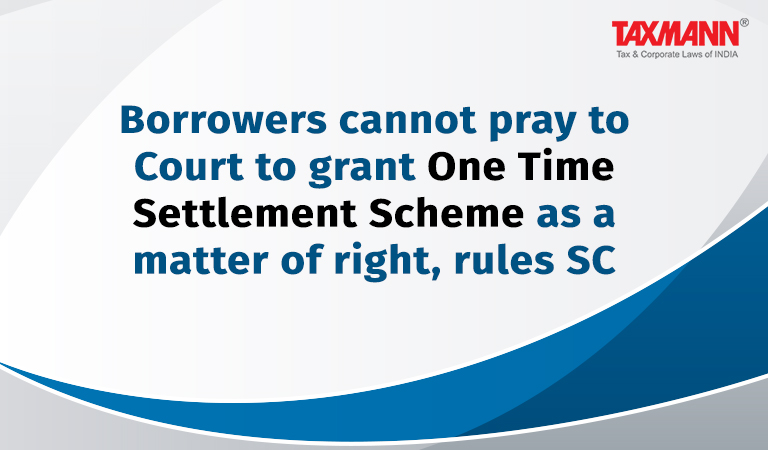Borrowers cannot pray to Court to grant One Time Settlement Scheme as a matter of right, rules SC
- Blog|News|FEMA & Banking|
- 3 Min Read
- By Taxmann
- |
- Last Updated on 11 January, 2022

Case Details: Bijnor Urban Cooperative Bank Ltd. v. Meenal Agarwal - [2021] 133 taxmann.com 167 (SC)
Judiciary and Counsel Details
-
- M.R. Shah and B.V. Nagarathna, JJ.
Facts of the Case
The borrower had obtained a credit facility from a bank categorised as “Non-Performing Asset (NPA)”. The bank initiated proceedings under the provisions of the SARFAESI Act, 2002. The borrower applied to the bank to consider her case under the One Time Settlement (OTS) Scheme. The bank rejected the application saying that she was not eligible for settlement under the OTS Scheme as her loan account had been declared as NPA. The loan could be recovered by auction of the mortgaged property.
The borrower filed a writ petition before the High Court to challenge the order passed by the bank rejecting her application for giving the benefit of the OTS scheme. The High Court issued a writ of mandamus and directed the bank to positively consider her application for grant of benefit under the OTS Scheme.
Supreme Court Held
On appeal, the Supreme Court held that no borrower could, as a matter of right, pray for a grant of benefit of the One Time Settlement Scheme. The Apex Court observed that it might happen that a person would borrow a considerable amount, for example, Rs. 100 crores. After availing of the loan, he may deliberately not pay any amount towards instalments, though able to make the payment. He would wait for the OTS Scheme and then pray for a grant of benefit under the OTS Scheme, under which always a lesser amount will be paid than the amount due and payable under the loan account. This, despite all possible recovery of the entire loan amount, can be realised by selling the mortgaged/secured properties.
The Court further stated that if it were held that the borrower can still, as a matter of right, pray for benefit under the OTS Scheme, in that case, it would be giving a premium to a dishonest borrower, who, even though can make the payment and the fact that the bank can recover the entire loan amount even by selling the mortgaged/secured properties, either from the borrower and guarantor. Under the OTS Scheme, a debtor has to pay a lesser amount than the actual amount due and payable under the loan account. Such cannot be the intention of the bank while offering OTS Scheme, and that cannot be the purpose of the Scheme, which may encourage such dishonesty.
If prayer is entertained on the part of the defaulting unit/person to compel or direct the financial corporation/bank to enter into a one-time settlement on the terms proposed by it/him, then every defaulting unit/person which/who is capable of paying its/his dues as per the terms of the agreement entered into by it/him would like to get a one-time settlement in its/his favour. Who would not like to get his liability reduced and pay a lesser amount than the amount they are liable to pay under the loan account? Asked Court
The Apex Court ruled that no writ of mandamus can be issued by the High Court in the exercise of powers under Article 226 of the Constitution of India, directing a financial institution/bank to grant the benefit of OTS to a borrower positively.
Given the above, the High Court, in the present case, has materially erred and has exceeded in its jurisdiction in issuing a writ of mandamus in the exercise of its powers under Article 226 of the Constitution of India by directing the appellant Bank to positively consider/grant the benefit of OTS to the original writ petitioner.
The Apex Court quashed and set aside the order passed by the High Court, holding it to be unsustainable.
Disclaimer: The content/information published on the website is only for general information of the user and shall not be construed as legal advice. While the Taxmann has exercised reasonable efforts to ensure the veracity of information/content published, Taxmann shall be under no liability in any manner whatsoever for incorrect information, if any.

Taxmann Publications has a dedicated in-house Research & Editorial Team. This team consists of a team of Chartered Accountants, Company Secretaries, and Lawyers. This team works under the guidance and supervision of editor-in-chief Mr Rakesh Bhargava.
The Research and Editorial Team is responsible for developing reliable and accurate content for the readers. The team follows the six-sigma approach to achieve the benchmark of zero error in its publications and research platforms. The team ensures that the following publication guidelines are thoroughly followed while developing the content:
- The statutory material is obtained only from the authorized and reliable sources
- All the latest developments in the judicial and legislative fields are covered
- Prepare the analytical write-ups on current, controversial, and important issues to help the readers to understand the concept and its implications
- Every content published by Taxmann is complete, accurate and lucid
- All evidence-based statements are supported with proper reference to Section, Circular No., Notification No. or citations
- The golden rules of grammar, style and consistency are thoroughly followed
- Font and size that’s easy to read and remain consistent across all imprint and digital publications are applied



 CA | CS | CMA
CA | CS | CMA
